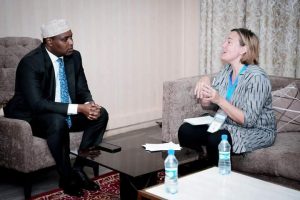Somalia has secured a $4.5 billion debt write-off from global lenders
marking the culmination of a decade-long process of negotiations and reforms.
The nation, which is just settling into the East African Community (EAC) after its admission two weeks ago, has been exempted from debt repayment under the enhanced Heavily Indebted Poor Countries (HIPC) Initiative.
The move by multilateral and bilateral lenders, including the World Bank, International Monetary Fund (IMF), significantly reduces the country’s debt to $600 million from a high of $5.2 billion, according to the World Bank.
Somalia’s external debt has now declined to less than six percent of GDP, from 64 percent in 2018.
A huge chunk of the debt relief has been made available by commercial creditors ($3 billion), followed by multilateral creditors ($573.1 million), World Bank’s International Development Association ($448.5 million), IMF ($343.2 million) and African Development Fund ($131 million).
The HIPC initiative was created by the IMF and World Bank in 1996 to allow all creditors to provide debt relief to the world’s poorest and most heavily indebted countries to reduce economic constraints inflicted by the debt-servicing burden.
The landmark announcement on Somalia’s debt forgiveness will be made in Washington DC on December 13 after the Bretton Woods institutions boards complete the approval process.
Somalia becomes the 37th country to reach the HIPC completion point, after Sudan and Zimbabwe fell by the wayside.
Somalia’s HIPC discussions started 10 years ago, under the current President Hassan Sheikh Mohamud, and the country has remained on the reform path despite political headwinds along the way.

World Bank country manager for Somalia Kristina Svensson, who spoke to The Media on Thursday, said Mogadishu’s commitment to reforms has been “remarkable”.
“There has been a lot of political challenges within Somalia, but this thing (principles of HIPC), they have held it quite high,” she said.
The debt write-off presents an historic opportunity for Mogadishu to turn the page after three decades of conflict, fragility and state fragmentation, and embark on the path of economic reconstruction, poverty reduction and inclusive growth.






comments (0)